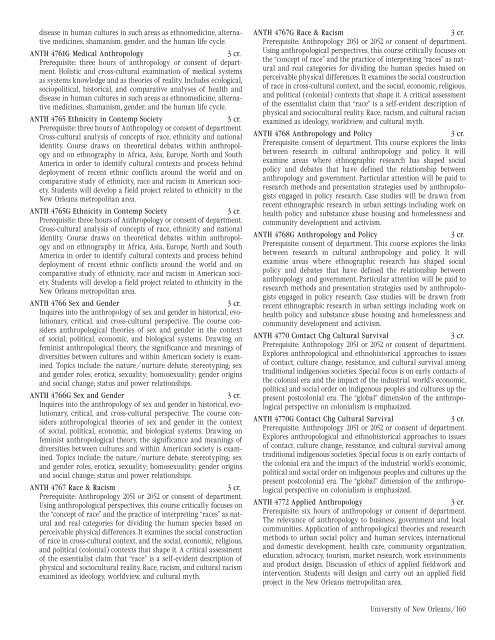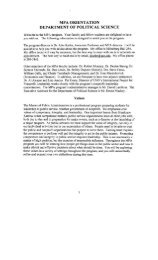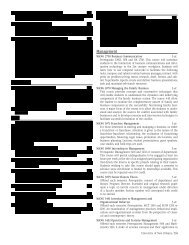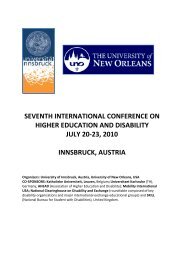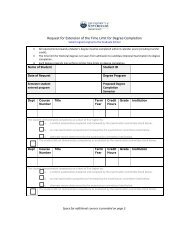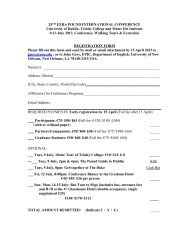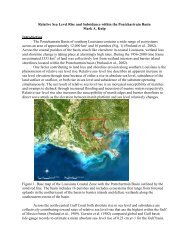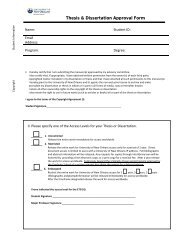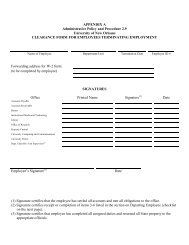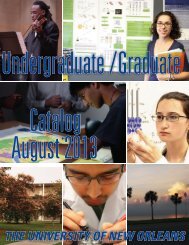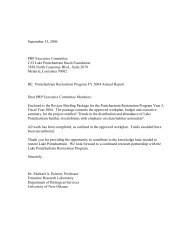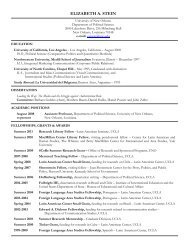Untitled - University of New Orleans
Untitled - University of New Orleans
Untitled - University of New Orleans
You also want an ePaper? Increase the reach of your titles
YUMPU automatically turns print PDFs into web optimized ePapers that Google loves.
disease in human cultures in such areas as ethnomedicine, alternative<br />
medicines, shamanism, gender, and the human life cycle.<br />
ANTH 4761G Medical Anthropology<br />
3 cr.<br />
Prerequisite: three hours <strong>of</strong> anthropology or consent <strong>of</strong> department.<br />
Holistic and cross-cultural examination <strong>of</strong> medical systems<br />
as systems knowledge and as theories <strong>of</strong> reality. Includes ecological,<br />
sociopolitical, historical, and comparative analyses <strong>of</strong> health and<br />
disease in human cultures in such areas as ethnomedicine, alternative<br />
medicines, shamanism, gender, and the human life cycle.<br />
ANTH 4765 Ethnicity in Contemp Society<br />
3 cr.<br />
Prerequisite: three hours <strong>of</strong> Anthropology or consent <strong>of</strong> department.<br />
Cross-cultural analysis <strong>of</strong> concepts <strong>of</strong> race, ethnicity and national<br />
identity. Course draws on theoretical debates within anthropology<br />
and on ethnography in Africa, Asia, Europe, North and South<br />
America in order to identify cultural contexts and process behind<br />
deployment <strong>of</strong> recent ethnic conflicts around the world and on<br />
comparative study <strong>of</strong> ethnicity, race and racism in American society.<br />
Students will develop a field project related to ethnicity in the<br />
<strong>New</strong> <strong>Orleans</strong> metropolitan area.<br />
ANTH 4765G Ethnicity in Contemp Society<br />
3 cr.<br />
Prerequisite: three hours <strong>of</strong> Anthropology or consent <strong>of</strong> department.<br />
Cross-cultural analysis <strong>of</strong> concepts <strong>of</strong> race, ethnicity and national<br />
identity. Course draws on theoretical debates within anthropology<br />
and on ethnography in Africa, Asia, Europe, North and South<br />
America in order to identify cultural contexts and process behind<br />
deployment <strong>of</strong> recent ethnic conflicts around the world and on<br />
comparative study <strong>of</strong> ethnicity, race and racism in American society.<br />
Students will develop a field project related to ethnicity in the<br />
<strong>New</strong> <strong>Orleans</strong> metropolitan area.<br />
ANTH 4766 Sex and Gender<br />
3 cr.<br />
Inquires into the anthropology <strong>of</strong> sex and gender in historical, evolutionary,<br />
critical, and cross-cultural perspective. The course considers<br />
anthropological theories <strong>of</strong> sex and gender in the context<br />
<strong>of</strong> social, political, economic, and biological systems. Drawing on<br />
feminist anthropological theory, the significance and meanings <strong>of</strong><br />
diversities between cultures and within American society is examined.<br />
Topics include: the nature/nurture debate; stereotyping; sex<br />
and gender roles, erotica, sexuality; homosexuality; gender origins<br />
and social change; status and power relationships.<br />
ANTH 4766G Sex and Gender<br />
3 cr.<br />
Inquires into the anthropology <strong>of</strong> sex and gender in historical, evolutionary,<br />
critical, and cross-cultural perspective. The course considers<br />
anthropological theories <strong>of</strong> sex and gender in the context<br />
<strong>of</strong> social, political, economic, and biological systems. Drawing on<br />
feminist anthropological theory, the significance and meanings <strong>of</strong><br />
diversities between cultures and within American society is examined.<br />
Topics include: the nature/nurture debate; stereotyping; sex<br />
and gender roles, erotica, sexuality; homosexuality; gender origins<br />
and social change; status and power relationships.<br />
ANTH 4767 Race & Racism<br />
3 cr.<br />
Prerequisite: Anthropology 2051 or 2052 or consent <strong>of</strong> department.<br />
Using anthropological perspectives, this course critically focuses on<br />
the “concept <strong>of</strong> race” and the practice <strong>of</strong> interpreting “races” as natural<br />
and real categories for dividing the human species based on<br />
perceivable physical differences. It examines the social construction<br />
<strong>of</strong> race in cross-cultural context, and the social, economic, religious,<br />
and political (colonial) contexts that shape it. A critical assessment<br />
<strong>of</strong> the essentialist claim that “race” is a self-evident description <strong>of</strong><br />
physical and sociocultural reality. Race, racism, and cultural racism<br />
examined as ideology, worldview, and cultural myth.<br />
ANTH 4767G Race & Racism<br />
3 cr.<br />
Prerequisite: Anthropology 2051 or 2052 or consent <strong>of</strong> department.<br />
Using anthropological perspectives, this course critically focuses on<br />
the “concept <strong>of</strong> race” and the practice <strong>of</strong> interpreting “races” as natural<br />
and real categories for dividing the human species based on<br />
perceivable physical differences. It examines the social construction<br />
<strong>of</strong> race in cross-cultural context, and the social, economic, religious,<br />
and political (colonial) contexts that shape it. A critical assessment<br />
<strong>of</strong> the essentialist claim that “race” is a self-evident description <strong>of</strong><br />
physical and sociocultural reality. Race, racism, and cultural racism<br />
examined as ideology, worldview, and cultural myth.<br />
ANTH 4768 Anthropology and Policy<br />
3 cr.<br />
Prerequisite: consent <strong>of</strong> department. This course explores the links<br />
between research in cultural anthropology and policy. It will<br />
examine areas where ethnographic research has shaped social<br />
policy and debates that have defined the relationship between<br />
anthropology and government. Particular attention will be paid to<br />
research methods and presentation strategies used by anthropologists<br />
engaged in policy research. Case studies will be drawn from<br />
recent ethnographic research in urban settings including work on<br />
health policy and substance abuse housing and homelessness and<br />
community development and activism.<br />
ANTH 4768G Anthropology and Policy<br />
3 cr.<br />
Prerequisite: consent <strong>of</strong> department. This course explores the links<br />
between research in cultural anthropology and policy. It will<br />
examine areas where ethnographic research has shaped social<br />
policy and debates that have defined the relationship between<br />
anthropology and government. Particular attention will be paid to<br />
research methods and presentation strategies used by anthropologists<br />
engaged in policy research. Case studies will be drawn from<br />
recent ethnographic research in urban settings including work on<br />
health policy and substance abuse housing and homelessness and<br />
community development and activism.<br />
ANTH 4770 Contact Chg Cultural Survival<br />
3 cr.<br />
Prerequisite: Anthropology 2051 or 2052 or consent <strong>of</strong> department.<br />
Explores anthropological and ethnohistorical approaches to issues<br />
<strong>of</strong> contact, culture change, resistance, and cultural survival among<br />
traditional indigenous societies. Special focus is on early contacts <strong>of</strong><br />
the colonial era and the impact <strong>of</strong> the industrial world’s economic,<br />
political and social order on indigenous peoples and cultures up the<br />
present postcolonial era. The “global” dimension <strong>of</strong> the anthropological<br />
perspective on colonialism is emphasized.<br />
ANTH 4770G Contact Chg Cultural Survival<br />
3 cr.<br />
Prerequisite: Anthropology 2051 or 2052 or consent <strong>of</strong> department.<br />
Explores anthropological and ethnohistorical approaches to issues<br />
<strong>of</strong> contact, culture change, resistance, and cultural survival among<br />
traditional indigenous societies. Special focus is on early contacts <strong>of</strong><br />
the colonial era and the impact <strong>of</strong> the industrial world’s economic,<br />
political and social order on indigenous peoples and cultures up the<br />
present postcolonial era. The “global” dimension <strong>of</strong> the anthropological<br />
perspective on colonialism is emphasized.<br />
ANTH 4772 Applied Anthropology<br />
3 cr.<br />
Prerequisite: six hours <strong>of</strong> anthropology or consent <strong>of</strong> department.<br />
The relevance <strong>of</strong> anthropology to business, government and local<br />
communities. Application <strong>of</strong> anthropological theories and research<br />
methods to urban social policy and human services, international<br />
and domestic development, health care, community organization,<br />
education, advocacy, tourism, market research, work environments<br />
and product design. Discussion <strong>of</strong> ethics <strong>of</strong> applied fieldwork and<br />
intervention. Students will design and carry out an applied field<br />
project in the <strong>New</strong> <strong>Orleans</strong> metropolitan area.<br />
<strong>University</strong> <strong>of</strong> <strong>New</strong> <strong>Orleans</strong>/160


